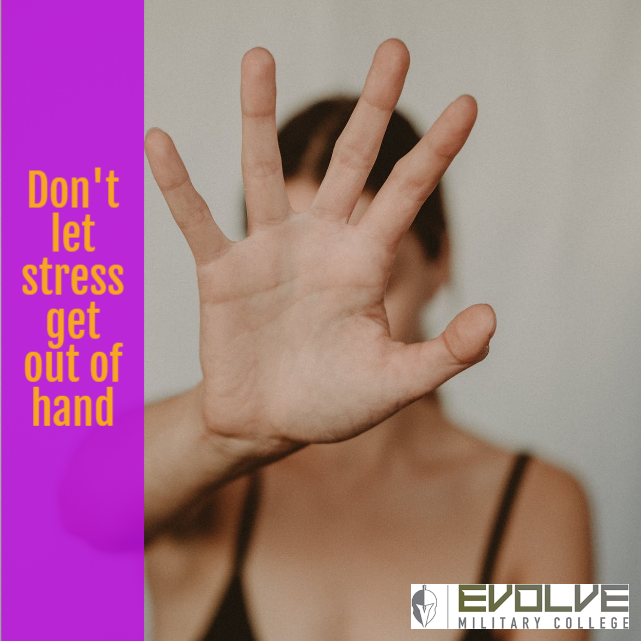The team at Evolve Military College prepare young people for joining the armed forces – and that involves both physical and mental preparation. Now more than ever, young people are feeling the effects of stress and in our latest blog, we look at three areas you should revaluate at if you’re feeling the pressure at the moment.
Fed up of hearing that people your age never had it so good?
The teenage years are often portrayed as a carefree stage of life-a non-stop party with no real commitments or responsibilities. But the statistics tell a different story.
In fact, it’s been shown that levels of stress in teenagers are actually very similar to the levels experienced by adults.
And perhaps we shouldn’t be surprised, what with the competing demands of coursework, exams, pressure to do well, relationships with family, friends, boyfriends and girlfriends. Then there are life changes like leaving school, getting on your chosen career path, too much to do, feeling unprepared or overwhelmed by tasks and this past year, living through a pandemic on top of everything else.
What are the symptoms of stress?
Stress is the body’s natural defence against real or imagined danger. It causes a surge of hormones (essentially cortisol) to prepare us either to face danger or escape from it. This is known as the ‘fight or flight’ response. The effect is the same whether our lives are actually in danger or not.
Ever felt that sudden surge in energy when you someone walks towards you late at night? That’s your fight or flight kicking in.The effects on your body can include:
• Feeling tired
• Having difficulty sleeping
• Losing your appetite
• Stomach aches
• Shoulder and neck ache or pain
• Skin problems
It’s not just physical either. The possible effects on your emotions can include:
• Feeling sad
• Feeling irritable or losing your temper easily
• Finding it difficult to keep your mind on your coursework
So what steps can you take to cope with stress?
The good news is there are plenty of things you can do to help you feel better.
1. A healthy diet
Your digestive system and emotional health are closely linked so think carefully about your diet.
Need some inspiration? Check out the link below:
https://www.bbcgoodfood.com/howto/guide/stress-diet-can-foods-help
• Get your day off to a good start with a nutritious breakfast. Don’t feel like eating porridge? Try Saucy bean baked eggs instead! With chronic stress our bodies crave protein, which helps control insulin release, so this is a great option.https://www.bbcgoodfood.com/recipes/saucy-bean-baked-eggs
• You’ve heard it before but aim for at least 5 portions of fruit and non-starchy veg each day for those stress-busting vitamins. The more colourful the better!
• Eating regularly is important as skipping meals causes blood sugar levels to fluctuate. And that can lead to tiredness and mood swings. Not in the mood for a full meal?
As tempting as it may be to grab a burger, fast food is packed with unhealthy sugars and additives that will give you a temporary high – then leave you crashing down.
2. Get enough Sleep
Lack of sleep increases levels of the hormones adrenaline and cortisol, making us feel wired, edgy and stressed. So, focus on developing a good routine at night-this can take time so stick with it. Avoid using your phone or other device before bed as they’re over-stimulating, it’s better to read a book which is more relaxing. Warm baths and caffeine-free drinks can help too. If you really can’t sleep, it’s best to get out of bed and do something else for a while. You will get to sleep faster if you get up and distract yourself until fatigue takes over. Lastly, try a sleep meditation – there are loads of great options on YouTube to try.
3. Do regular exercise
Exercise is a key way to combat stress by reducing the levels of both cortisol and adrenaline in our bodies. It also triggers the release of endorphins, feel-good chemicals in the brain, which are natural painkillers as well as mood enhancers.
Exercise doesn’t necessarily have to be vigorous- a brisk walk if you feel stressed not only deepens breathing but also helps relieve muscle tension. And in yoga or tai chi the combination of fluid movements with deep breathing and mental focus can induce feelings of calm.
Remember that each of us may respond differently to stress but it can have a real impact on our lives:
59% of young people say that balancing all their activities causes stress, 40% say it makes them irritable, 37% say it causes them to feel overwhelmed and 30% feel sad or depressed because of stress.
Signs that stress is getting too much and that you should get help:
• You feel that stress is affecting your health.
• You feel so desperate that you think about stopping school, running away or harming yourself.
• You feel low, sad, tearful, or that life is not worth living.
• You lose your appetite and find it difficult to sleep.
• You have worries, feelings and thoughts that are hard to talk about because you feel people won’t understand you or will think you are ‘weird’.
• You hear voices telling you what to do, or making you behave strangely.
• You are using drugs or alcohol to block out stress.
*This blog is for information and does not replace the advice of a relevant health professional.
Text the YoungMinds Crisis Messenger for free 24/7 support across the UK if you are experiencing a mental health crisis.
• If you need urgent help, text YM to 85258.
• All texts are answered by trained volunteers, with support from experienced clinical supervisors.
• Texts are free from EE, O2, Vodafone, 3, Virgin Mobile, BT Mobile, GiffGaff, Tesco Mobile and Telecom Plus.
